Marketing is full of myths, anecdotes, and long-held beliefs of what drives growth. I think part of our job as marketers is to continually question these assumptions.
It’s easy for marketers to get entranced by the idea that consumers will fall in love with our brands. Former Saatchi & Saatchi CEO Kevin Roberts coined the term “Lovemark” in 2005 and popularized the idea that the aim of marketing was to cultivate “loyalty beyond reason.”
This idea continues to drive marketing strategy, despite the lack of evidence to back it up. Marketers frequently exaggerate the importance of their brands in consumers’ lives. As Byron Sharp has researched, consumers tend to be loyal to a repertoire of brands and “loyalty is often more a function of habit, familiarity and lack of caring rather than unbound devotion.”
I like how how Ad Contrarian Bob Hoffman articulated this in a talk last year:
“Creating a strong brand should be every marketer’s primary objective and the highest role of advertising is to create a strong brand. But our industry has taken these truths and twisted them into silly fantasies…
“There’s a widespread belief in our business that consumers are in love with brands. That consumers want to have brand experiences and brand relationships and be personally engaged with brands and read branded story telling. People…have a lot of things to care deeply about. It’s very unwise to believe that they care deeply about our batteries, our wet wipes and our chicken strips.”
Or as Mars CMO Bruce McColl put it:
“Most of us go through life finding it hard enough to have good relationships with the real people in our life. Let alone all the brands we buy.”
Here are a few related cartoons I’ve drawn over the years:
“Brand Laddering” June 2012
“Inside the Mind of the Consumer” January 2014 & September 2007
“Brand Loyalty” December 2016 & May 2005
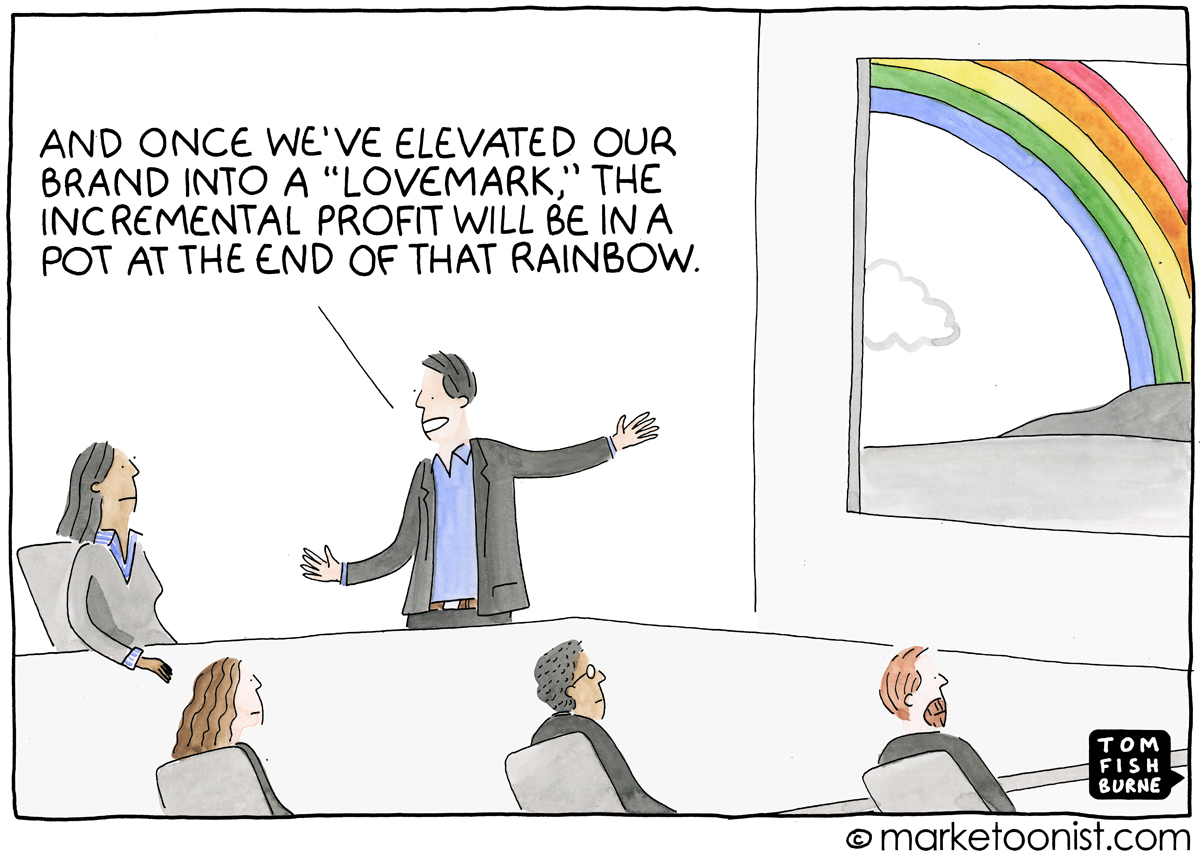

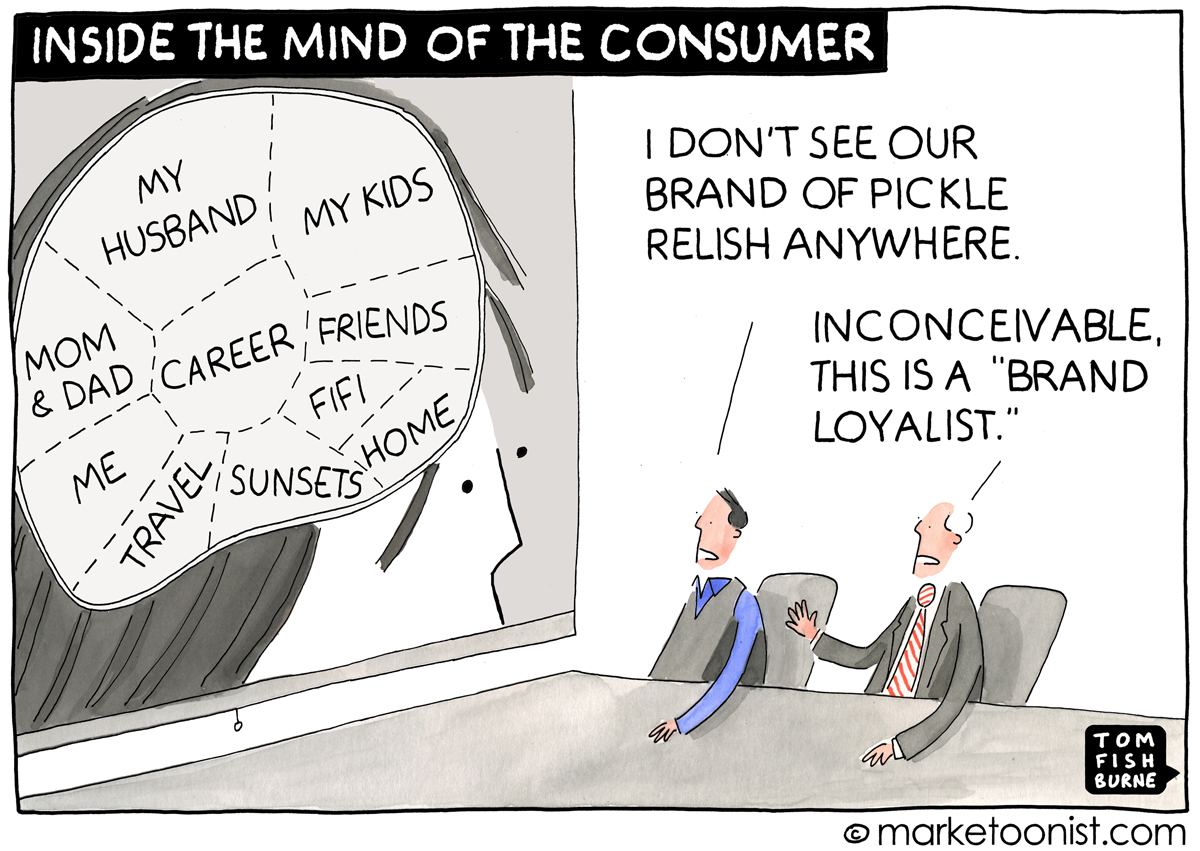
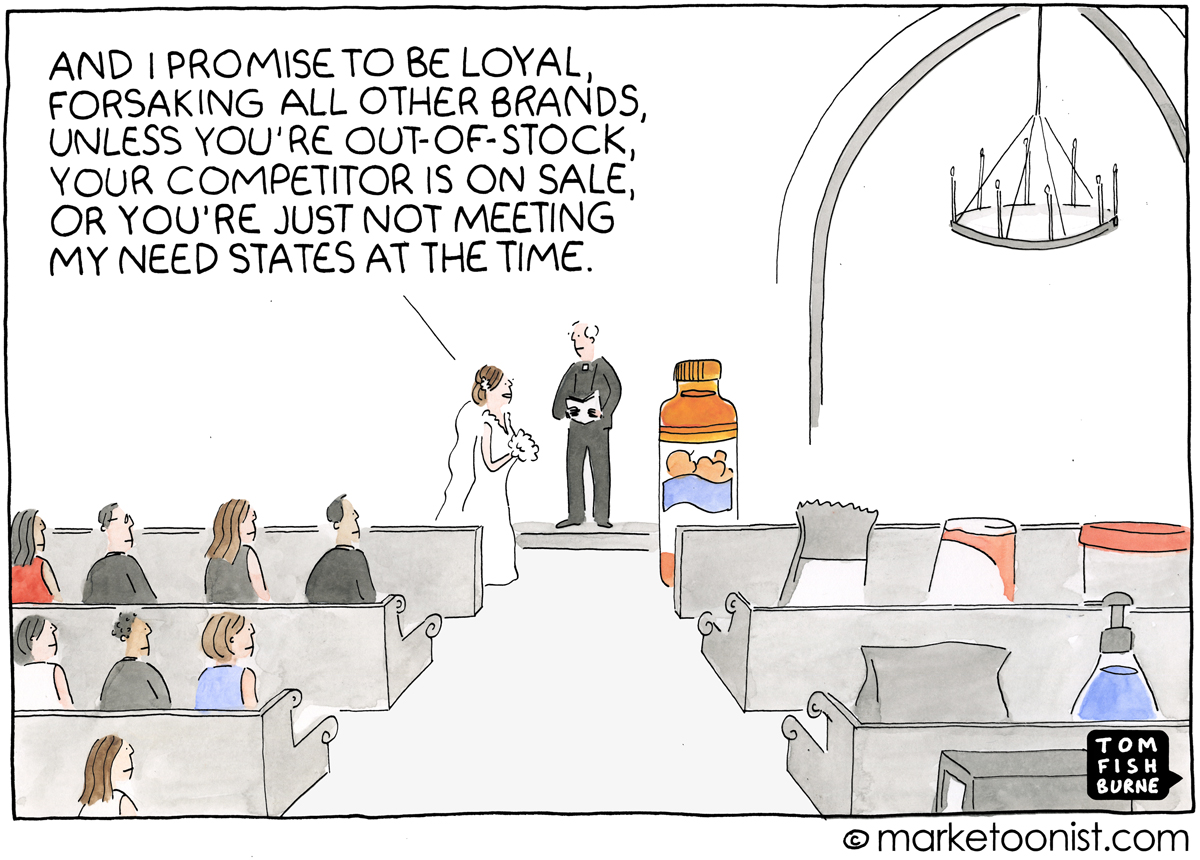
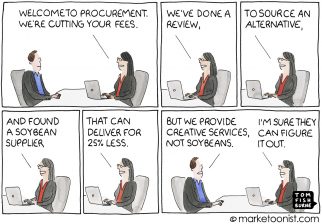
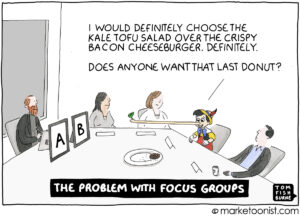
Seán says
Many marketers have certainly drank the cool-aid of their own PR spin when it comes to brand relationships. To get the best out of some marketers its an illusion that they need to exist. Knowing their product is identical in all but the graphic design of the box or logo can have them fall into an existential abyss. For those who attach the daily meaning of their life to their brand to discover they are just moving market share points around for something that could disappear tomorrow and would only be missed by the trade press, is a dark prospect. As one director of an internal FMCG company wryly noted at a conference many years ago that I attended, we need to keep marketers entertained and believing they make a difference, without doing any real damage, until we actually need them.
David says
Nailed it on the head again Tom. I created an imaginary marketing director to sum up this nonsense called Hugo in my Where’s the Sausage? book with a whole approach to branding called ‘Hugbrands’!
Henry Mason says
You make a compelling case Tom. However, painting it as purely pointless is an oversimplification.
The biggest trend in the consumer arena is that because of its sheer scale & fragmentation, for *every* trend, the counter-trend is also happening simultaneously.
So yes, while *most* consumers won’t care about *most* brands, there will always be certain consumers that do care way too much about certain categories or brands.
Should brand managers focus *all* their attention on that subset? That’s where Byron Sharp would say no. But for the biggest brands, pandering to (and indeed cultivating) this extreme loyalty is unlikely to be a bad thing. But yes, are brand fanatics a *source* of growth? Probably not: distribution channels and an aligned business model are more important.
Jason says
“Pandering to and cultivating extreme loyalty” is LIKELY to be a bad thing, because it takes person-hours, money, time, effort, resources and commitment AWAY from cultivating precisely the buyer you DO need for growth – the uncaring, uncommitted, light-buying cognitive misers who in their great numbers (for they are the vaaaaaaaaaaast majority) hold the key to Brand growth – or decline.
Michael Morris says
There is a dose of pragmatism that we marketers need to swallow periodically. Many product categories are just not that important to our consumers – certainly not as important to consumers as they are to us as marketers. Consumers “hire” products to do a job in their lives and many of those jobs are rather routine. By serving as a reminder of past positive interactions and meaningful benefits, brands provide consumers freedom from choice, helping simplify purchase decisions for consumers in a world of nearly overwhelming options. It is true that for many brands in many categories, the vast majority of sales volume is “a function of habit, familiarity and lack of caring.”
We would all love our brands to have the slavish loyalty and resultant advocacy some brands have (such as Apple). The reality is that most brands of consumer products are not closely linked to how we want others to see us. While not “unbound loyalty”, being the consumer’s default choice when thinking about a category is a pretty profitable place to be.
Jason says
Please read Byron Sharp. You will discover that Apple has about the level of Brand loyalty you would expect it to have for its size – in fact, a VERY slightly greater loyalty than you would expect, because of its unique OS. Apple does not have “slavish loyalty and resultant advocacy” – or if it does, they don’t benefit it at all, since its repeat purchase rates are not out of line with other Brands in its category. The same is true of that paragon of supposed “slavish loyalty”, Harley Davidson. Please read Byron Sharp.
Craig says
spot on!
David Harris says
Brand loyalty is an unfortunate term, and it is ironic that marketers are so easily swayed by the marketing of consultants and agencies. Loyalty is a concept that fits with our relationship to people. Iconic brands, such as Harley Davidson or Apple, have been able to find a place in peoples’ narrative identity in that such brands plays a part in stories we tell ourselves and others about who we are. But that is not loyalty to the brand. That is all about the brand offering a benefit to me. And for most brands, the benefits simply price, taste, long-lasting, etc. I know, the VP wants someone running this brand who can increase brand loyalty and be disruptive with line extensions.